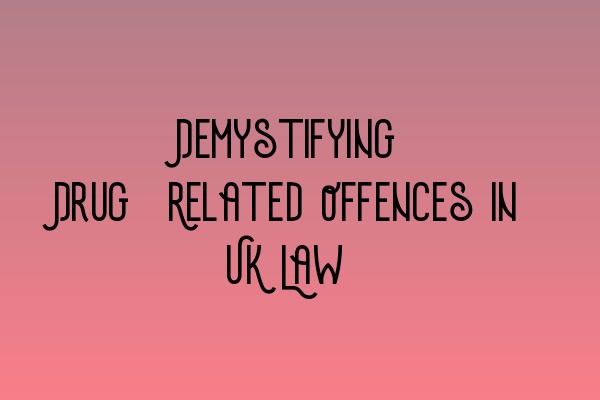Demystifying Drug-Related Offences in UK Law
Welcome to SQE Criminal Law & Practice Law UK! We are committed to providing essential information and guidance on various legal issues. In this blog post, we will demystify drug-related offences in UK law, shedding light on the complexities surrounding this topic.
Understanding Drug-Related Offences
Drug-related offences are a pervasive problem in society, and the UK legal system has specific laws in place to address them effectively. Offences can range from simple possession to more serious crimes, such as possession with intent to supply, production or cultivation of drugs, and drug trafficking.
It is crucial to understand that drug-related offences are categorized based on the type and quantity of drugs involved. Different drugs attract different penalties, and factors such as the offender’s intent or involvement in the drug trade also influence the severity of punishment.
The Legal Framework
In the UK, drug-related offences fall under the Misuse of Drugs Act 1971, which classifies drugs into different classes based on their potential harm and medicinal benefits.
The Act specifies a classification system consisting of Class A, B, and C drugs. Class A drugs, including heroin and cocaine, are considered the most harmful and carry the highest penalties. Class B drugs, such as cannabis and amphetamines, are less harmful but still attract serious consequences. Class C drugs, such as anabolic steroids, have the lowest penalties, although possession with intent to supply remains a serious offence.
It is essential for individuals to have a clear understanding of the laws governing drug-related offences to ensure compliance and avoid severe legal consequences. SQE Criminal Law & Practice Law UK offers comprehensive SQE 1 preparation courses that cover all areas of criminal law, enabling aspiring solicitors to gain in-depth knowledge and excel in their legal career.
Penalties for Drug-Related Offences
The penalties for drug-related offences vary depending on the seriousness of the offence, the class of drug involved, and the defendant’s role in the crime. Offenders can face fines, community orders, or custodial sentences. In some cases, rehabilitation programs may be offered as an alternative to imprisonment.
It is important to note that drug-related offences can have long-lasting consequences beyond the criminal justice system. Convictions can impact employment prospects, travel opportunities, and one’s overall reputation.
Defending Drug-Related Charges
If facing drug-related charges, it is crucial to seek professional legal advice immediately. A skilled solicitor specializing in criminal law can evaluate the circumstances of the case, identify any potential defenses, and provide guidance throughout the legal process.
SQE Criminal Law & Practice Law UK understands the complexities of drug-related offences and offers expert legal advice and representation. With our comprehensive SQE 2 preparation courses, aspiring solicitors can develop the necessary skills to defend clients effectively.
Conclusion
Drug-related offences in UK law can be complex and daunting, but with the right knowledge and guidance, individuals can effectively navigate the legal system. The Misuse of Drugs Act 1971 provides the legal framework for drug-related offences, categorizing drugs based on their potential harm.
At SQE Criminal Law & Practice Law UK, we are dedicated to assisting aspiring solicitors in achieving their professional goals. Our SQE exam dates are designed to meet the needs of busy individuals, allowing them to prepare comprehensively for the Solicitors Qualifying Examination.
To enhance your legal knowledge and skills, check out our related articles:
- SQE 1 Practice Exam Questions
- SQE 1 Practice Mocks FLK1 FLK2
- SQE 2 Preparation Courses
- SQE 1 Preparation Courses
- SRA SQE Exam Dates
Feel free to explore our website for more information on our services and how we can assist you in your legal journey.
